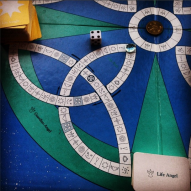In a recent game of Transformation, I drew this card — one I’d gotten only once or twice before — that really hit home for me in a new way:

But lately … I’ve been feeling a lot more vulnerable … and (paradoxically) a lot safer, too.
|
I love that the search tags for this are “Courageous” and “Inspiring”
|
It’s not an original thought, but basically, one has to risk rejection in order to be accepted.
(Alternatively, you can chose to spend your entire life waiting for the other person to say, “I love you” first.)
And these days, I’m feeling the vulnerability on lots of different levels, everything from condo application forms to my creative projects.
Take WITH CHILD, the wonderfully quirky indie film I’m associate producing.
After one or two rejections from second tier festivals, we found out we were shortlisted for Critics Week at Cannes, arguably the most important festival in the world.
Being short-listed is a game changer for the project, but one that happened only because we decided to forge ahead and keep applying, knowing (correctly) that our film would find its perfect audience.
Most directly in my own life now, I’m being more vulnerable than ever before in my new work, specifically in the new book proposal I’m writing where I’m sharing more deeply about parts of my own life.
Interestingly, while working on this material, I had an encounter with someone I was writing about, a person with whom I was once intimately involved a decade and a half ago.
Fifteen years later, there has been not a single moment of acknowledgment, much less apology, for any of their part in our past.
I can only assume that utter lack of vulnerability is a strategy to save face, to appear strong and powerful.
Yet the paradox of taking no responsibility for your own flawed past is that you basically cast yourself as a complete victim. Trying to convince yourself that nothing was ever your fault means that you’ve had absolutely no control over anything in your life.
In her talk, Brené Brown concludes by revealing that simply believing one is worthy is the distinguishing factor that allows a person to live wholeheartedly.
That’s because whole-hearted people can afford to take the risk of being vulnerable, because somehow they’ve learned that
Worthy ≠ Perfect




